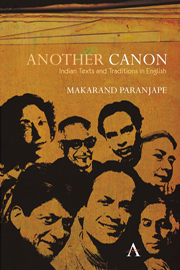Book contents
- Frontmatter
- Contents
- Preface
- 1 Introduction
- 2 Conversations in Bloomsbury
- 3 Comrade Kirillov
- 4 ‘A Horse and Two Goats’
- 5 The Tale of an Indian Education
- 6 ‘Clip Joint’
- 7 Cultural and Political Allegory in Rich Like Us
- 8 Towards Redefining Boundaries
- 9 The Golden Gate and the Quest for Self-Realization
- 10 Journey to Ithaca An Epistle on the Fiction of the 1980s and 1990s
- 11 Cuckold in Indian English Fiction
- 12 Stephanians and Others
- Works Cited
- Index
11 - Cuckold in Indian English Fiction
Published online by Cambridge University Press: 05 March 2012
- Frontmatter
- Contents
- Preface
- 1 Introduction
- 2 Conversations in Bloomsbury
- 3 Comrade Kirillov
- 4 ‘A Horse and Two Goats’
- 5 The Tale of an Indian Education
- 6 ‘Clip Joint’
- 7 Cultural and Political Allegory in Rich Like Us
- 8 Towards Redefining Boundaries
- 9 The Golden Gate and the Quest for Self-Realization
- 10 Journey to Ithaca An Epistle on the Fiction of the 1980s and 1990s
- 11 Cuckold in Indian English Fiction
- 12 Stephanians and Others
- Works Cited
- Index
Summary
Insiders and Outsiders
It would not be an exaggeration to consider Kiran Nagarkar as one of the least recognized and most talented of Indian English novelists. As such his best book Cuckold (1997), is an obvious and fitting candidate for this book celebrating another canon of Indian English fiction. But before I discuss this text, it would be useful to locate Kiran Nagarkar in the tradition of Indian English writing because as a bilingual and marginalized writer, he himself quite aptly represents alternate canonicity. I wish to approach my task in a somewhat unorthodox way by beginning both on a personal and a parochial note. Originally, the context of such a beginning was Kiran Nagarkar's winning the Sahitya Akademi award in 2001 for the best book in English by an Indian author. Since I knew Kiran and was one of those who had nominated this book for the award, I was particularly thrilled that he got the award – though it came not a day too soon.
Even at the risk of sounding somewhat chauvinistic, I must point out that Nagarkar is not only the first Maharashtrian to get the award for English fiction, but also the first Chitpavan Brahmin to be so recognized. Such an observation, quite paradoxically, becomes relevant or significant precisely because any attempt to capitalize on or emphasize Kiran's Chitpavan-ness or Marathi-ness so as to place him in a larger body of writers or a tradition of writing, comes a cropper.
- Type
- Chapter
- Information
- Another CanonIndian Texts and Traditions in English, pp. 130 - 147Publisher: Anthem PressPrint publication year: 2009
- 1
- Cited by



